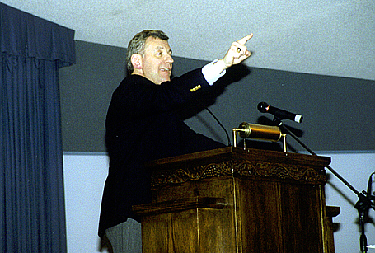General Board of Global Ministries
![]()
UM Information
UM
Reporter
![]()
Florida Southern College
![]()
Bethune
Cookman College
![]()
FL UM Children's Home
![]()
|
|
Institute challenges pastors to enter public square |
|
Photo by Michael Wacht |
The Rev. Bill Lawrence describes how John Wesley made eye contact with the chancellor of Oxford University while delivering a sermon condemning the nation's leadership for its lack of spirituality. "The pulpit has the responsibility to enter the marketplace," Lawrence said. "They will not know the truth that will set them free unless we tell them." |
| By Michael Wacht LEESBURG — In 1744 at Oxford University in England, John Wesley, the founder of Methodism, challenged the Christianity of Britain’s political and educational leaders. While it was the last sermon Wesley ever preached there, "the power of his final proclamation of the Gospel has echoed for 255 years," said the Rev. Bill Lawrence. Lawrence is senior pastor of Metropolitan Memorial United Methodist Church in Washington, D.C., and was one of two speakers at the Feb. 7-9 Institute of Preaching. Themed "The Pulpit and the Public Square," the institute addressed how preachers can faithfully take the message of the Bible into the public arena. Dr. Emmanuel Cleaver II, senior pastor of St. James United Methodist Church in Kansas City, Mo., and mayor of Kansas City, spoke of his experience serving in both the church and city government. "There’s no excuse for a Christian pastor not to have an impact on your community," he said. "We are required by God to matter." In his keynote address, Lawrence described the settings and impact of some of Wesley’s sermons and those of his father, Samuel, that dealt with public issues, including capital punishment and slavery. "Methodist preachers have always used the public square," he said. Describing how the elder Wesley once preached while standing on a gravestone, Lawrence said any method that gets a preacher in public view is a good one. "A scaffold at a busy intersection will work," he said. "So will a Web site with audio and video capacity and in front of the leaders of our communities…any method we can find." He said pastors must be prepared to preach both personal and social holiness in public. "We must say to corrupt systems not only that we condemn them, but we are empowered by God to transform them." The Rev. Kelly Greenawald, pastor of Port Tampa United Methodist Church, Tampa, said she was reminded that being a prophet is part of the call to ministry. "We often preach love and grace, but it’s a harder road to be prophetic," she said. "As pastors, we’re also called to speak boldly and speak the truth, even when it’s difficult." Both Cleaver and Lawrence said preachers who enter the public arena do so on God’s authority and urging. "If the church can’t influence society then we are doomed," Cleaver said, "and God will be ashamed of His prophets." Top
of this page |

